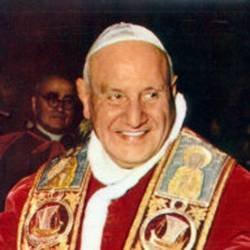You just could not look at the images without crying.
Since his election, it seems that anything that Pope Francis I says or does goes viral within minutes. However, this Wednesday's papal audience seemed to move people even more than usual and many to tears. Yesterday, Pope Francis embraced a man with neurofibromatosis, a genetic disorder of the nervous system that causes boil-like tumors to form on the nerves and manifest everywhere on a person's body.
The emotional scars of loneliness and isolation that accompany such a brutally disfiguring condition must certainly be as excruciating as in this painful physical condition. The natural tendency to be repelled by disfigurement causes so many people to shun our sisters and brothers who suffer from physical disabilities. Our own fears and self-preservation can too often alienate and isolate those people who endure terrible physical suffering and need our tender embrace for their emotional wellness as well as the medical treatment they need to survive. The east side of hell can be as much of a torment as its polar opposite.
The world seemed compelled to look upon the pictures of Pope Francis as he held this boil-ridden man and prayed over him in a panorama of photographs that captured not only the pope's compassionate act but the obvious gratuity and relief of the sick man whose posture during his encounter with the pope told his heartbreaking story without his having to utter a word. Who could help but think of Jesus who laid his hands on the sick and cured them, of Francis of Assisi and of Damien who lived among lepers, of Mother Teresa who cared for the most indigent population as the crucified Christ in their "distressing disguise of the poor?" We think of extraordinary people who model such utter selflessness. We gaze in awe upon people like Francis. "He's the vicar of Christ," someone wrote as a response to one blog posting. "After seeing these pictures, it's hard to dispute that fact."
Kudos to Pope Francis for giving us yet picture of the reign of God here and now. But I get to see that kind of event unfold all the time. I volunteer in an urban hospital emergency department that is one of forty agencies and three hospitals within a large not-for-profit and non-religiously affiliated health care system where, in the words of James Joyce, "Here comes everybody."
In my book, health care providers wear invisible halos. If you're fortunate enough to know good health except for an occasional bout with a cold virus, there would be little reason for you to think about health care providers who face life and death issues minute to minute every hour of every day. Healthcare providers do what Pope Francis did on Wednesday 24/7/35 for the plethora of patients who pour through the doors of hospitals and health agencies everywhere. Sickness is never convenient, never welcome and seldom anticipated. Health care providers treat all patients without judgment, reserve or discrimination. Sickness is the great equalizer. Each person treated is an encounter with the Holy.
The emergency department where I work is often a mayhem of madness as health care providers try to beat the clock to meet the onslaught of hundreds of sick people who wait to be treated for an unimagined plethora of illnesses. Physicians and nurses often skip meals (there's really no time to sit and eat, believe me), kiss their spouses and kids on their cell phones because "we just got really busy and I'll be a bit late" and power walk through the mouse maze of EMS rooms, gurneys, trauma, treatment rooms and labs as ambulance after ambulance delivers the critically ill while the waiting rooms pile up with people whose illness may be less urgent but no less important as the sick wait to be seen and treated.
Everyone who comes through the doors of a hospital needs and wants the same things: competent care offered with compassion and kindness. The most successful practitioners are the caregivers who not only medically treat their patients but invest the same kind of healing, compassionate embrace that the world witnessed when Pope Francis embraced the man with a severe case of neurofibromatosis. "You're so kind," is a phrase I hear often when I deliver a warm blanket, a bucket, an ice pack, a wet cloth, a cup of coffee and a sandwich to a family member and lend an ear to someone who may be entirely alone. More often than not, one smile and a touch on someone's arm will bring on an onslaught of emotions that are pent up and waiting to burst as widely as a damn after months of too much rain. People just really want to know that they've not been forgotten. A warm hand can mean the world to someone who has been left out in the cold for far too long. Good clinicians offer that hand more often than I can tell you.
Clinicians who deal with all of the medical issues that people present them and take the time to offer encouragement, sympathy, a warm embrace and even a bit of humor, which can really take some of the bite of illness are heroic. These women and men have responded to the cry of the poor in the fundamental level of human life: the care of the sick without bias or inequity. Even the untouchables (and there are so many) are held, treated, served, embraced, loved. The banquet of eucharistic life is often celebrated on a gurney in profound moments of grace that look very much like the pictures of the pope holding a very sick man.
Pope Francis has a world wide stage to show us what love, charity and compassion look like for our beloved sick. This is what the banquet of eucharistic life looks like when we are moved beyond our intellects and allow our heart's response to catapult us into love in action. The Second Vatican Council envisioned it this way:
“In the early days, the church linked the “agape” to the Eucharistic supper, and by so doing showed itself as one body around Christ untied by the bond of charity. So too, in all ages, love is its characteristic mark. While rejoicing at initiatives taken elsewhere, it claims charitable works as its own mission and right. That is why mercy to the poor and the sick, charitable works and works of mutual aid for the alleviation of all kinds of human need, are especially esteemed in the church. “Gaudium et Spes 8
Many health care providers embody this message in brave new ways as they forge and pioneer innovative methods in the field of medicine. One such group of insightful nurses believes in their mission so much that they've created a data base for prospective new nurses seeking the health care profession. RN to BSN Degree Programs Directory is an educational resource and database of major nursing programs from all accredited colleges in the U.S. While so many people attempt a work/life balance that includes exploring affordable educational opportunities, RN to BSN database provides the public insight to key information across a vast amount of programs offered, including nursing scholarships.
Because of the Affordable Care Act (Obamacare) and the growing amount of newly insured individuals, the need for health care workers has never been greater. RN to BSN provides thorough information to everyone to offer them an opportunity to pursue a degree in a nursing program of their choice without being bound by cost or location. This kind of passionate work is at the heart of excellent service within the field of health care.
The Acountable Care Organization is another health care initiative carving a new niche to provide better health initiatives through its compassionate, creative and visionary work that's just getting off the ground. That's what I'm talking about: ordinary people doing extraordinary work on behalf of the people of God through the prompting of the Spirit of God - whether they know it and believe it or not.
The images of Pope Francis will remain with us for a long time. But perhaps we need to create new images by leaving what is comfortable behind and moving toward something unfamiliar. Maybe God is waiting to sculpt us into something new and wonderful. We may find ourselves completely shattered, like a glass that falls on a tile floor and breaks into what seems irreparable. With grace, reparation is always possible. Human instinct moves us toward the familiar, where we are comfortable and what will challenge us the least, like looking at pictures of someone that we would find difficult to touch. Do we leave that up to a pope and to health care providers or do we accept the counter-cultural invitation of Jesus who invites us to go and seek out (
that means we have to move) and touch and hold and be with the poor, the brokenhearted, the sick, the dying, the young, the old and everyone in the middle?
Church, here comes everybody. Christian discipleship can be uncomfortable, disconcerting, smelly, dirty, painful (backbreaking, actually), unreasonable and very often times against our nature. But when we embrace the work the same way that Francis embraced that man, despite the doubts, the frustrations, our own pain and what we think we need to survive the utter madness of walking toward discomfort rather than away from it is the beginning of our own transformation. The joy of giving beyond one's comfort zone can exceed the expectations of what we think of as our own limits and borders. That's the grace of God at work in us - holding an untouchable and looking forward to holding another.

 Denise Morency Gannon
Denise Morency Gannon


